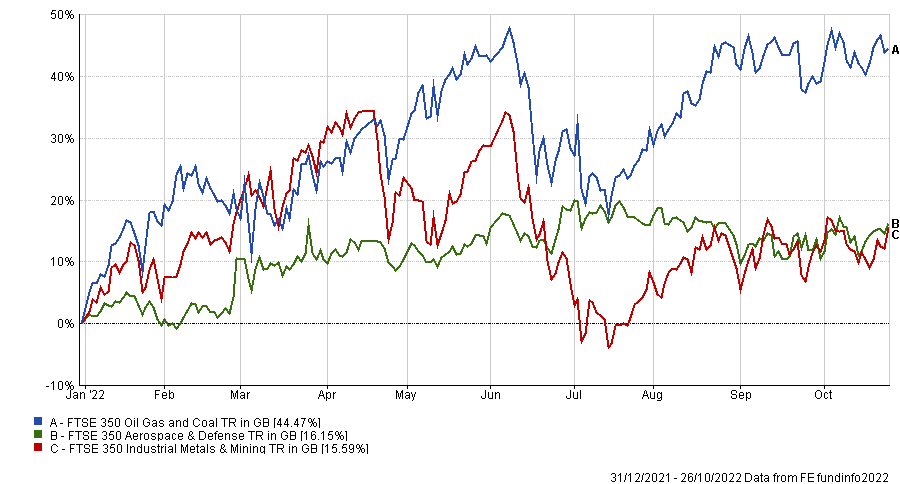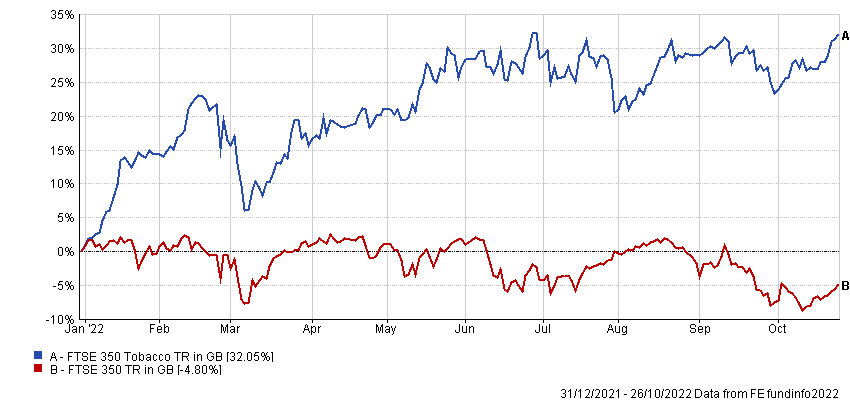There isn’t another sector in the market that can touch tobacco for its risk/reward trade-off, according to James Harries, manager of Trojan Global Income.

The fund is about to reach its sixth anniversary, while Trojan Ethical Global Income, which the manager also runs, is about to celebrate its first.
Harries said that the latter fund was launched after a client said they were a fan of Trojan Global Income but wanted a strategy that excluded a number of morally questionable sectors, including tobacco.
“We had a choice to make at this point,” said Harries (pictured). “Alcohol and tobacco make up around 13% of Trojan Global Income, and I could have tried to find assets with a similar risk/return profile for the ethical fund.
“But we don't think there's anything that has quite the same risk/reward profile as tobacco. The combination of high returns on capital employed, brand distribution, financial productivity and value from that sector is virtually impossible to replicate.”
As a result, he decided instead to search for companies with a lower starting yield, but a higher prospect of dividend growth. These included names such as Colgate-Palmolive, Universal Music Group, bioscience company Chr Hansen and medical device manufacturer Coloplast.
“The initial income will be slightly higher in Trojan Global Income, but will grow more quickly in the ethical fund,” Harries continued.
“The core client base for Troy is people with irreplaceable capital who need income, which tends to coincide with retirement. We try to provide a growing income without scaring people too much with volatility.
“Because the ethical fund has a slightly lower yield and is growing faster, it may appeal to a younger crowd or people who don't yet have irreplaceable capital, and who are perhaps more conscious of expressing a view with where they invest their capital.”
Harries likes to buy and hold companies for the long term, which means he needs to have confidence they will continue to generate strong cashflows over the next decade or so. This has led him away from areas that are “having their day in the sun” this year, such as defence, where the limited number of potential customers affects pricing power, and natural resources, including oil & gas.
Performance of indices in 2022

Source: FE Analytics
“They're dependent upon a commodity price over which they have no control,” he explained. “We understand the argument that there's been a degree of underinvestment, meaning this is a better environment for them, but we still think they're not inherently good businesses.
“You may have been clever enough to buy them 12 or 18 months ago when they were cheap, but we think you're going to have to sell them at some point, and therefore we'd rather not be there.”
This long-term view may sound incompatible with his enthusiasm for tobacco – the sector appears to be in decline, due to growing regulatory pressures and a trend towards healthier lifestyles.
However, he pointed out tobacco companies are now moving towards non-traditional products such as e-cigarettes and heat-not-burn technology, and the manager said there are two reasons to be positive about this trend.
“First is that these next-generation products are more profitable at scale, because they're taxed less heavily than the traditional businesses as governments are seeking to encourage people to move to the less harmful products,” he explained.
“And second, the impetus to stop consuming nicotine is less strong, because they are much less harmful for you. A few years ago, we didn't know what the future looked like for these businesses, but we are now in a position where the algorithm is very predictable: mid-to-high single-digit returns split between income and capital, which has been uninterrupted, and we suspect will be interrupted for a number of years.”
Performance of indices in 2022

Source: FE Analytics
Other fund managers are less convinced about the prospects for these next-generation products, even if they are optimistic about the tobacco sector as a whole.
British American Tobacco and Imperial Brands are top-10 holdings in Richard Marwood’s Royal London UK Equity Income fund. But when asked whether he agreed next-generation tobacco products could be more profitable than traditional areas, he replied: “It’s something that the companies would say to you: that you can charge what looks like a lower price, but you can make more money.”
Marwood said that companies tend to exist in two different worlds – how they are perceived and the “hard reality” of the cashflows they generate. In this way, he said he is yet to be convinced the amount of capital the tobacco companies have ploughed into non-traditional areas will prove to be money well spent.
In particular, he said he was concerned about the way tobacco companies “indiscriminately” ploughed cash into vape and heat-not-burn products, adding that while volumes for cigarettes are shrinking by a single-digit percentage every year, pricing and cost efficiencies make up for this.
“These [next-generation] businesses will continue to grow, and the core tobacco business will continue to shrink. But it’s the point about where would they be if they were just pure tobacco businesses? It's that point about deploying capital: you want businesses to generate cash, and you want them to deploy it well,” Marwood added.
“Now these businesses definitely generate cash. But was the way they deployed it and the way they chased after these new markets done well? It probably wasn’t great. And that destroyed some shareholder value.”





